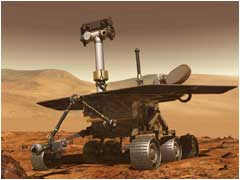 |
 |

NASA's Mars Exploration Rover. After landing on Mars in January 2004, it found evidence of water. It is still continuing its mission.(Courtesy of NASA)


Japan's asteroid probe, Hayabusa, is expected to reach the asteroid, Itokawa, in the summer of 2005. It is the first spacecraft that will return a soil sample from an asteroid to the Earth. The sample will be collected on the Earth in the summer of 2007.
 |
|
 |
 |
 |
 |
 |
 |

What would you like to see in Japanese space exploration or space science?
I see the exploration program as a set of eras. The first era was just learning how to get to another planet, and just the achievement of doing that was success. That led to the second era, which started in the 1970s, where the issue was to find what was out there, and that was the Voyagers and the Galileos and the Cassinis, which were very large missions with many instruments. Today we are in the third era. The intent now is to go, to explore, and eventually bring samples back. That's the third era of exploration, and we are already well into that era both in terms of Mars and in terms of asteroids. You might ask, what's the fourth era? The fourth era is going and staying, putting infrastructure in place on objects in the solar system so that we have a permanent presence in those places, connected back to Earth by radio link, so they are actually part of our experience.
One nice thing about the third era is that once you say you're going to land and explore, you have many, many places to choose from. Even one world like Mars has many places to visit; the moon has many places to visit. So it really opens up the opportunity for much broader participation in exploration once we move into the third and fourth era. So I think the opportunity for invention and technology, which allows one to explore the surfaces of other worlds, of asteroids - to sample an asteroid for instance - is very important. And that's the kind of capability that JAXA can invest in, so that they can contribute and be an important part of expanding these frontiers of space.
Do you think it's very important to educate young people about space?
I think that young people generally are interested in space, but they need to feel that something new is going to happen in a reasonable span of their lifetime. So that young people can see that the future is bound to be different from the present because things will be known, and that they could possibly learn those things, which would change what we know today. It's very important that the young people feel a sense of opportunity for the future; that it's not just the past that they're learning about, but they are learning about the past because it is leading to the future, and they can be part of creating that future if they take the right kinds of mathematics and science. Then they can help create the future, the new knowledge, which is ahead. The reason our standard of living is what it is, is because of the investment in science and engineering over the last 20-30 years. And that investment is in and the students who then become the scientists and engineers and technical people who create the new capability, that improves our quality of life.
So that's why it's very important as we move into this new era that we have a continuing series of explorations. The most exciting thing to me is to see something for the first time that I had not even thought of seeing. Because that's when there is the most to learn, and of course that's the reason Voyager is such an exciting mission. It certainly was for the Jupiter, Saturn, Uranus and Neptune. Now, as we approach interstellar space, we're seeing things that are beyond our imagination, and that's the thing that is most exciting about the space program. It provides the opportunity to learn things that are dramatically new and different.
|
 |
 |
 |
 |
 |
|

